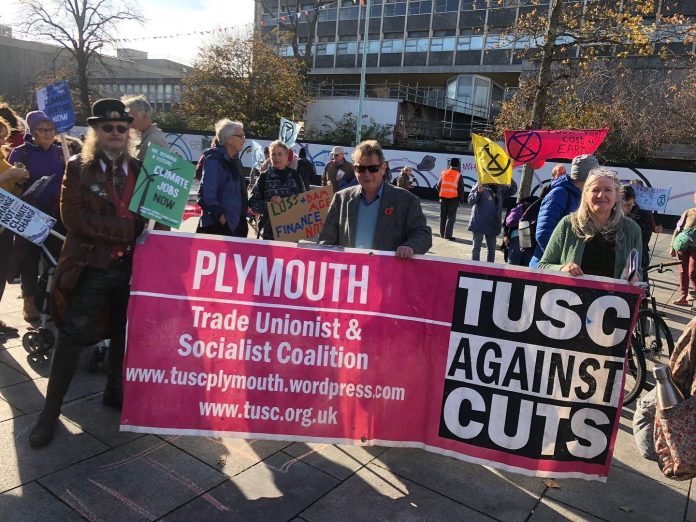Vote TUSC on 4 May
Duncan Moore, Plymouth Socialist Party
Whatever local authority area you live in, it is overwhelmingly likely that it will have declared a “climate emergency”. The vast majority of the UK’s local authorities and all the devolved administrations have made this formal acknowledgment that climate change threatens suffering and death for millions this century, and have pledged to mitigate it by reducing carbon emissions.
My own council in Plymouth, for instance, has pledged to make the city carbon neutral by 2030. But achieving this will require measures which none of the main parties contesting the 4 May local elections are willing to take. This year, just 725 homes in Plymouth (a city of 250,000 people) will get energy-saving improvements from large housing associations that have received government grants to pay for installing insulation and double glazing in the homes they provide.
Councils have financial reserves and the ability to borrow money to pay for insulating homes and installing heat pumps. They could help reduce the impact of soaring bills from profiteering energy companies on residents’ finances and help to reduce carbon emissions.
By taking measures such as these, councils would win massive popular support. By helping to mobilise local trade unions and working-class communities, councils would be in a strong position to demand the restoration of local authority grants cut by the Tories.
In 1984, 49 Labour councillors in Liverpool, led by Militant (the Socialist Party’s predecesor), refused to transfer the burden of Margaret Thatcher’s Tory government cuts onto the backs of the Liverpool working class. Their willingness to mobilise the city to fight back against the Tories meant it was the only council to succeed in extracting extra funding from the government.
On 4 May, Socialist Party members are standing as part of the Trade Unionist and Socialist Coalition (TUSC), ready to do battle with the Tories just as the Liverpool councillors did.
Much like the Militant-led Liverpool council won popular support to build thousands of good-quality council homes, a council prepared to defy Tory austerity could implement the building of energy-efficient council housing, and install wind turbines and solar panels, as democratically agreed by the community. In coastal cities such as Plymouth, investment in tidal power too.
In recent years, Sheffield and Plymouth councils have cut down trees in their city centres, spoiling the urban environment we live in and destroying a natural method of removing carbon dioxide from the air. Socialist Party members oppose the undemocratic means by which councils, acting hand-in-glove with big development companies, have vandalised our public spaces in this way against the wishes of residents.
Instead of imposing congestion charges and taxes on polluting vehicles, which can unfairly affect working-class people less likely to be able to afford compliant vehicles, councils could invest in green public transport to give residents a free and environmentally friendly way of getting about.
By taking bus companies back into council ownership, services could be planned and run to meet need rather than to make profits for companies running expensive, infrequent and unreliable services. Services could be made freely available for all.
None of these changes will be won without a struggle. But if we fight we can win these demands, to improve living standards for working-class people rather than making endless cut backs. Rather than empty rhetoric about the ‘climate emergency’ from Labour, Tories, Lib Dems and Greens, we need real action!







